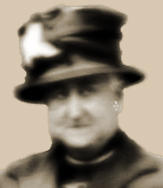Impairment vs disability
Lady Bracknell had the great good fortune to be introduced to the social model of disability by one of the finest and most incisive minds in the disability sphere. To save his blushes (for he is a most humble and diffident gentleman), she will refer to him here only as Mr C.
The social model of disability is a relatively simple concept. Lady Bracknell understands that, for persons who have been indoctrinated for many years into regarding themselves as in some way "less than normal", and as a drain on society, assimilating the social model into their mindsets may require considerable mental re-shuffling. Nevertheless, the principle itself is neither complex nor abstruse.
Lady Bracknell is therefore baffled as to why social model theory results in such demonstrably widespread confusion both within and outside the disabled community.
For those to whom the concept is entirely new, her ladyship has long recommended what her editor assures her is described as "an online training package" provided by Professor Zee as an introduction to the subject.
She is pleased to note, however, that Professor Gregor Wolbring (as reported in Spero News) is discussing the issues in a manner which may perhaps bring enlightenment to those who have so far failed to grasp the basics. Readers with even a passing interest in the subject are recommended to read the article.
For her own part, Lady Bracknell feels that she must point out at this juncture that persons who say that they would favour a mixture of the social and medical models have fully understood neither the purpose nor the remit of the social model.
Despite assertions to the contrary by a coterie of its most extreme apologists, there is nothing in the social model which denies its adherents the right to seek a cure for their impairments. Neither does the social model claim that, should a time come when all physical and attitudinal barriers to the full participation of persons with impairments in society have been removed, those same persons will cease to experience bodily or mental functional loss or difference.
Lady Bracknell has no doubt that many of her readers are only too grateful for the advances in medical science which go at least some way to alleviating symptoms which would otherwise either be very significantly harder to live with than they are now, or might even have proved fatal. But that in itself is no reason either to espouse the medical model of disability or to reject the social model as being inadequate for one's own needs.
(Lady Bracknell is of the opinion that it is the name of the medical model which is largely responsible for such confusion. Were it to be renamed as, let us say, the "you must be kept away from normal, decent people because there is something freakishly and disgustingly wrong with you" model, Lady Bracknell would venture to suggest that far fewer disabled people would be likely to misunderstand its true nature.)
The social model of disability is a relatively simple concept. Lady Bracknell understands that, for persons who have been indoctrinated for many years into regarding themselves as in some way "less than normal", and as a drain on society, assimilating the social model into their mindsets may require considerable mental re-shuffling. Nevertheless, the principle itself is neither complex nor abstruse.
Lady Bracknell is therefore baffled as to why social model theory results in such demonstrably widespread confusion both within and outside the disabled community.
For those to whom the concept is entirely new, her ladyship has long recommended what her editor assures her is described as "an online training package" provided by Professor Zee as an introduction to the subject.
She is pleased to note, however, that Professor Gregor Wolbring (as reported in Spero News) is discussing the issues in a manner which may perhaps bring enlightenment to those who have so far failed to grasp the basics. Readers with even a passing interest in the subject are recommended to read the article.
For her own part, Lady Bracknell feels that she must point out at this juncture that persons who say that they would favour a mixture of the social and medical models have fully understood neither the purpose nor the remit of the social model.
Despite assertions to the contrary by a coterie of its most extreme apologists, there is nothing in the social model which denies its adherents the right to seek a cure for their impairments. Neither does the social model claim that, should a time come when all physical and attitudinal barriers to the full participation of persons with impairments in society have been removed, those same persons will cease to experience bodily or mental functional loss or difference.
Lady Bracknell has no doubt that many of her readers are only too grateful for the advances in medical science which go at least some way to alleviating symptoms which would otherwise either be very significantly harder to live with than they are now, or might even have proved fatal. But that in itself is no reason either to espouse the medical model of disability or to reject the social model as being inadequate for one's own needs.
(Lady Bracknell is of the opinion that it is the name of the medical model which is largely responsible for such confusion. Were it to be renamed as, let us say, the "you must be kept away from normal, decent people because there is something freakishly and disgustingly wrong with you" model, Lady Bracknell would venture to suggest that far fewer disabled people would be likely to misunderstand its true nature.)











4 Comments:
Excellent summary and analysis, Lady Bracknell!
Marmiteboy is very much looking forward to working with Mr C this coming week. Like your goodself the Social Model had a profound and positive effect on me when I was shown it.
I also can heartily recommend Professor Zee's online package. I have cribbed from in it on a number of ocassions and have always found it to be an excellent and straight forward way to explain both the Medical and Social Models.
Great post, thank you.
Does Mr C have a web presence?
Sadly, no. Although he has given Lady Bracknell to understand that there are a number of books in the pipeline. Real ones. With pages. Made of paper.
The moment her ladyship has concrete information, she will report fully in the virtual pages of this blog.
Post a Comment
<< Home